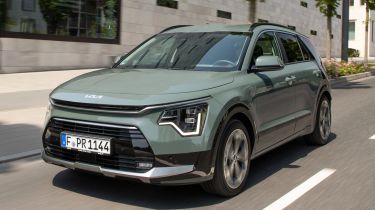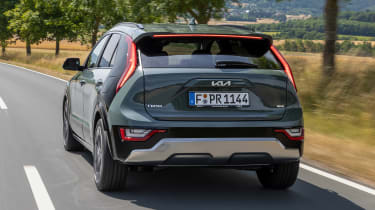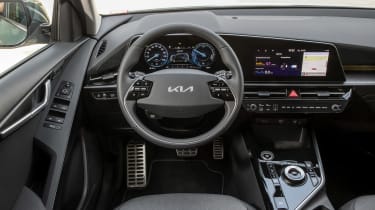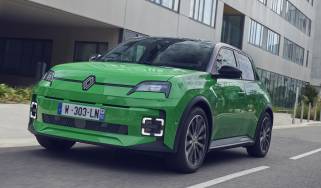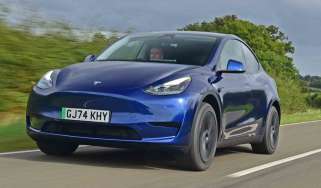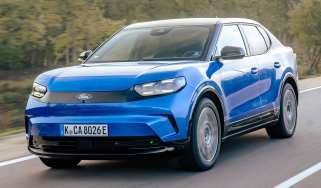New Kia Niro Hybrid 2022 review
The new Kia Niro Hybrid is cheaper to buy than the PHEV and pure-EV versions, but does it come with some limitations as a result? We find out…
Verdict
Some might expect that a dual-purpose EV and combustion-engined platform would compromise the new Kia Niro, but it's worked wonders for the hybrid version. Featuring the same mature drive, versatility and excellent interior tech as the pricier pure-electric version, it's great value. It's efficiency is also a plus, but we'd appreciate a quieter and more effortless powertrain.
The Kia Niro has been a sales hit for the Korean firm, with more than 70,000 cars finding homes in the UK since its launch in 2016. This year sees the arrival of a brand-new version that’s based on an upgraded platform and it’s looking to build upon the value, tech and practicality that made the original so endearing.
The hybrid version we're testing is the most affordable new Niro at £27,745, but PHEV and fully electric versions are also available for extra outlay. No matter which Niro you choose, though, the design is far more adventurous than before. At the front, a thin, chrome-trimmed grille and boxy LED headlights mark out the new Niro, with two-tone paint available for the front bumper and sills.
It won't be to all tastes, but there's certainly no mistaking the Niro for anything else - especially with the option of a contrast colour C-pillar. This integrates with the slender, rising tail-light units and helps direct air along the side of the car to improve airflow, too.
More reviews
Car group tests
- BYD Atto 3 vs Kia Niro EV 3: 2023 twin test review
- MG4 vs Kia Niro EV: 2022 twin test review
- Kia Niro vs Nissan Juke: 2022 twin test review
In-depth reviews
Long-term tests
Road tests
Used car tests
The new Niro is based on Kia's K3 platform, which promises improved safety, dynamics and refinement compared with its predecessor on the move. It's also grown in every direction, and this has liberated more cabin space than you got in the outgoing car; tall passengers will have no qualms with the roomy rear seats and there's a respectable 451-litre boot.
But while Kia has boosted the Niro’s practicality, it’s the interior tech that has taken the biggest leap. All versions are kitted out with an eight-inch infotainment touchscreen, Android Auto, Apple CarPlay, a DAB radio and a rear parking camera as standard, but higher spec models receive a class-leading line-up of tech derived from the firm’s EV6 flagship.
Twin 10.25-inch screens sit on the dash, running Kia’s latest intuitive infotainment software. But while the central touchscreen could be a shade more responsive, the graphics are sharp.
Only the cheap gloss black centre console detracts from what is an attractive cabin, just like with the Niro EV and PHEV, set off by ambient lighting on the dashboard and rising door panels that swoop up to meet the base of the A-pillars. Overall, quality is good too, and the major contact points are high-quality plastic.
The Niro Hybrid uses a development of the 1.6-litre petrol engine from the previous model, assisted by an electric motor for a total output of 139bhp. The car prioritises pure-electric running at low speeds, making for smooth, near-silent progress in town - but eventually the petrol engine cuts in with a distant grumble. The transition is near seamless, though, and the electric motor continues to provide extra punch on the move.
There's enough performance for most situations and the set-up works well enough under light loads, but on slip roads or during an overtake the Niro kicks down and the petrol engine drones noisily, where the more powerful plug-in variant can lean on its punchier electric motor. The six-speed dual-clutch automatic gearbox is at least relatively smooth, and the steering wheel-mounted shift paddle can double up to adjust the level of regenerative braking.
With its comparatively small battery pack the Niro Hybrid is the lightest of the three variants on offer, and while it doesn't serve up much fun, you do notice the lack of inertia through direction changes compared with its siblings. The steering is accurate, too, and the weighting is consistent, making it easy to thread through narrow lanes and guide through corners.
Sensibly, Kia hasn't chased sportiness with the new Niro, so while it can feel wayward when pushed (we’re not sure many buyers will do this anyway), the trade-off is a compliant ride. The Niro Hybrid is actually more settled than the heavier EV version over undulating sections of tarmac, but it doesn’t take the edge off short, sharp road imperfections quite as effectively. It’s also relatively refined at constant motorway speeds when the engine isn’t under stress, since wind and road noise are well suppressed.
The Niro EV achieves impressive claimed efficiency of 59.8mpg and 107g/km of CO2, and more than 50mpg should be within reach for owners. Of course, it won’t be as cheap to run as the EV, which remains the most complete option in the line-up, but the Niro Hybrid serves up many of that car’s strengths but costs £8,500 less.
It's difficult to beat as a value proposition, albeit less so in top-spec 4 guise which costs £33,245. This version is equipped with a head-up display, heated rear seats, a power tailgate and an electric sunroof, along with a Harmon Kardon stereo, so you do at least get a smattering of extra kit for the money.
| Model: | Kia Niro Hybrid 4 |
| Price: | £33,245 |
| Engine: | 1.6-litre four-cylinder petrol hybrid |
| Power/torque: | 139bhp/265Nm |
| Transmission: | Six-speed dual-clutch automatic, front-wheel drive |
| 0-62mph: | 10.8 seconds |
| Top speed: | 101mph |
| Fuel economy: | 59.8mpg |
| CO2: | 107g/km |
| On sale: | Now |

